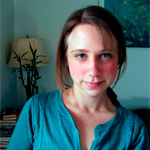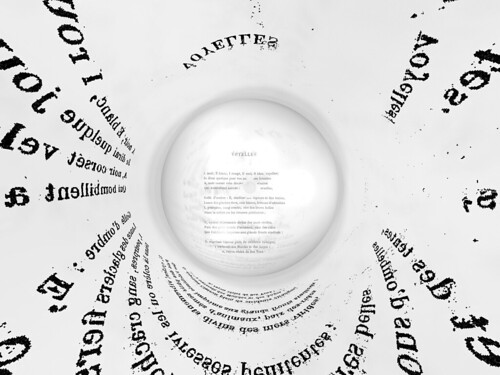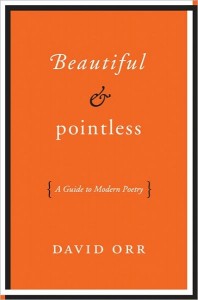 Why did I feel such hope when I first heard about David Orr’s new book, Beautiful and Pointless: A Guide to Modern Poetry? I’ve read my share of poetry guides, and most of them have taken up residence in a particularly dusty neighborhood on my poetry bookshelf. But Orr’s book had a title that pretty much summed up my own weary but hopeful sentiments about contemporary poetry. He wasn’t going to fume about how the once-great art has gone to hell or, on the other end of the spectrum, tell me rapturously that poetry is “news that stays news” or “the best language in the best order” or “imaginary gardens with real toads in them.” Not that I don’t love such pithy poetry fluffer phrases. I happen to adore them (especially yours, M. Moore). But just now they are not quite enough.
Why did I feel such hope when I first heard about David Orr’s new book, Beautiful and Pointless: A Guide to Modern Poetry? I’ve read my share of poetry guides, and most of them have taken up residence in a particularly dusty neighborhood on my poetry bookshelf. But Orr’s book had a title that pretty much summed up my own weary but hopeful sentiments about contemporary poetry. He wasn’t going to fume about how the once-great art has gone to hell or, on the other end of the spectrum, tell me rapturously that poetry is “news that stays news” or “the best language in the best order” or “imaginary gardens with real toads in them.” Not that I don’t love such pithy poetry fluffer phrases. I happen to adore them (especially yours, M. Moore). But just now they are not quite enough.
You see, I am standing here on the threshold of releasing my first book of poems. Like a pregnant overpopulation expert, I am happy but embarrassed about my condition and looking for ways to explain and justify it to the world. Hundreds of books of poetry come out every year from presses ranging from high profile to out-of-someone’s-basement. The number of copies sold for most of these books more closely resembles a figure you’d expect for some of those one-of-a-kind homemade wrist warmers on Etsy than mass-produced books with a marketing plan behind them. I expect most of the non-poets who buy my book will share my last name. And I expect a fair cross-section of those purchasers will stick to complimenting the cover and the abstract accomplishment of publishing a book.
It’s easy to wonder at the point of publishing within a genre that goes virtually unread. And, even though I have put down books of poetry in the last year that have left me stunned and delighted, and even though I am one of FWR’s ambassadors of poetry, I don’t think I could explain to you why otherwise reasonable people do it. So when the poet and critic Craig Morgan Teicher described David Orr’s book on Slate, I felt those little butterflies in my stomach that I get when I think someone’s finally going to write the ultimate demystification of poetry. Orr’s an interesting and light-footed reviewer for the New York Times Book Review, and he seems to understand what needs to be tackled: poetry’s alienation from the rest of the literary world, not to mention the non-literary world; its “inbred culture”; and the intimidation factor that makes people feel they are not equal to reading poetry even if they suddenly get the urge. (As Orr notes in the book, “Even if most people don’t know what poets do, the average person feels that whatever it is, it must be spectacular.”) I also got the impression from the Slate article that Orr was going to admit that poetry was made by poets, something that you might think is obvious but that so many poetry guides ignore, preferring to treat poems as objects that appear with intact codes and intentions, like stars formed by natural gases in deep space.
Let’s put aside Orr for a moment. Consider the poet. Yes, not the lobster. (I will resist using as a metaphor for poets that blue-blooded and shelled creature that scuttles across the ocean, fierce and clawing, but is most often seen piled obscenely in a tank with too many of its own kind, claws rubber-banded…) No, consider the poet. The writer’s life—any writer’s life—is tough, and I have nothing but admiration for those of you with the attention spans and scope of vision to craft short stories and novels. But when you tell people you write novels, they have at least read some, sometimes even happily, on sunny beaches. They may not have read your type of novel, but they register object recognition. When I tell people I’m a poet, I cannot say the same. They know what poems are, of course, but most of them don’t understand how poems make up books and could not name a book of poems they’ve read in the last year or even five years. In fact, to discover the last poem they read, you’d probably have to ask when they graduated from high school and put the pushpin approximately there, along with the last map-able brain wave devoted to the quadratic equation and the Magna Carta.
When I tell people I’m a poet (or when they discover it against my efforts to conceal it) they usually ask me right away, “What do you write about?” It’s a well-meaning question, one that nevertheless makes me want to respond, “I don’t know. What do you live about?” (On a side note, I am seriously contemplating a second book of poems all on one subject, and one of the things to recommend that approach is that, next time I get the inevitable question, I will be able to respond cheerily, “Ducks! I write about ducks!”)
My answer is usually so scattered and grasping that I only further confirm the stereotype of poets as pretentious word-fetishizers not quite smart enough to write real books with characters and plots… or the other stereotype of poets as dreamy, stunted adolescents still writing about how the world doesn’t understand them in diaries with tiny pick-able locks. People also want to know if my poems rhyme (answer: only if I hate them) or are in a form they know, like haiku (Richard Howard is reported to have said that reading too much haiku is “like being nibbled to death by goldfish”). They also want to know if I make money/a living as a poet (a question I am seldom able to answer to, due to my uncontrollable laughter).
My dear fiction writers, I am sure you get your share of well-meaning but ultimately wearying questions, but most people know what you want (superficially: a book contract, hordes of readers, Ryan Gosling playing your main character in the movie version… more meaningfully: to write the great American novel and be discussed in literature classes). Poets want similar things, but we scale our expectations down a bit (movie adaptations of poems are few and far between), and we are in the odd position of having to explain that we understand we have virtually no readers and write anyway. Also, if we want to get published, we almost always have to enter a first book contest, which is embarrassing, the equivalent of putting on a swimsuit and parading across a stage for a panel, while you guys get to put on suits and ties and go on a proper job interview. Then, when we do get published, releasing the book is, in the words of Don Marquis, like “dropping a rose petal down the Grand Canyon and waiting for the echo.” And that defeatist assessment describes success in poetry, folks! Imagine failure.
But the truth is that I would set aside all my cynicism about this strange business if I could just have a good answer to the question of why I write poetry, read poetry, and care about poetry in the first place. And David Orr was going to come up with it, I was sure. He was going to build the perfectly engineered and constructed bridge between me and the non-poets. Gosh, I’d even take a rope bridge.
This week at my office job (the sugar daddy to my poetry career) I am taking a mandatory online Defensive Driving course. It’s unintentionally funny and woefully out of date, but the one thing it has in spades is definitions. “Defensive driving is driving to save lives, time, and money,” the movie trailer voice tells me. This is sort of what I secretly hoped David Orr would do for poetry. “Poetry is using words to save the world, expand the mind, and rejuvenate a tired language!” the movie trailer voice would say… and then we’d be walked through five real-world scenarios that showed it doing just that.
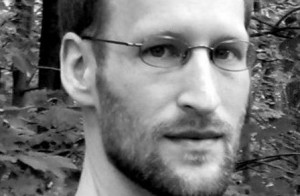
David Orr
But he doesn’t. Instead Orr writes a perfectly enjoyable, reasonable and sometimes funny book about “two mutually uncomprehending factions: the poets, for whom poetry is a matter of casual, day-to-day conversation; and the rest of the world, for whom it’s a subject of at best mild and confused interest.” He write eloquently about how the public feels “trapped between a tediously mechanical view of poems and an unjustifiably shamanistic view of poetry itself,” but he is less Martin Luther King declaring “I have a dream…” and bridging great divides than a political analyst sharply and smartly characterizing the mutual suspicion of today’s political factions on CNN.
Orr breaks the discussion up into sections: The Personal, The Political, Form, Ambition, The Fishbowl, and Why Bother. In “The Personal,” he addresses the widely held (and often paralyzing) assumption that poetry is the “pure expression of our inner lives,” when of course it is a much more complicated and impure expression. He even includes an anecdote of a woman appalled to learn that he gets paid to criticize poetry! While I wish he’d gone a bit further in debunking some of these assumptions and prejudices, to go much further might have required a search warrant for poets’ brains. None of us really ever knows how personal a poem is. My most personal poems (in the sense of being closest to actual experience and unfiltered thoughts) are seldom my best ones and seldom even seem the most personal.
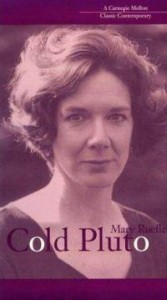
Mary Ruefle
One poem I adore for its rash, goofy confessionalism is Mary Ruefle’s “Snow”. How can you not feel like you know something about the woman—something quite intimate!—once you have read this poem? Yet how can you ever know for sure that “Snow” isn’t merely a whimsical exercise? Perhaps Mary Ruefle gets amorous only on the sunniest of days and is on a tropical beach with her lover at this very moment, laughing at us. What makes “the personal” appealing is not just that it exposes someone. It’s that it juxtaposes that exposure with something more universally revelatory like, in this case, those “quiet, cold, gentle sleepers who cannot think of themselves,” who make the original meteorological striptease all the more poignant and sweet. And even the most constructed poem is personal. What, after all, is more intimate than being in someone’s imagination?
In “The Political,” Orr acknowledges that politics and poetry are “both matters of verbal persuasion,” which means they ought to be very comfortable in each other’s company (and indeed, in other times and other countries, they have been). Nevertheless, he is probably right when he asserts that “the average voter, upon being told that a group of poets felt strongly about a particular issue, would be less likely to say, ‘Well, I am persuaded!’ than to say, ‘We have poets? Do they wear capes?’”
Orr does a fine job with the easier task—identifying the attributes of bad political poetry: “[Many pseudo-political poems] put forward no argument, make no revelatory comparison, confront no new audience, engage no misconception in language likely to be understood by the deceived, and so on and so on. Instead, they enact a version of the contemporary meditative lyric—‘here I sit, having some poetic thoughts’—with a few political words taking the place of, for instance, reference to waterfalls and foliage.” Poets may not change hearts and minds, especially not hearts and minds that aren’t already leaning into poems, and the best political poems may not be the most persuasive or vice versa. They may not even be recognizable as political.
Yet I am surprised that Orr does not identify some of the more compelling political endeavors in contemporary poetry, such as CD Wright’s full-length book on Louisiana prisons (One Big Self), Brian Turner’s war poetry, Jorie Graham’s 2008 book on global warming (Sea Change, which I must admit I haven’t read yet), or the very presence of Brenda Hillman, an abstract and cerebral poet who has actually managed to scare real members of Congress with her presence at hearings and sessions, if only because of the primal, vestigial sense that poets are dangerous to politicians, especially dishonest politicians.
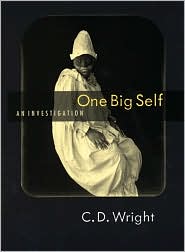
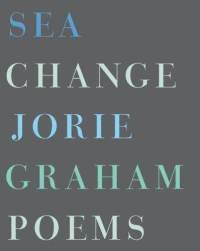
“Form” allows Orr to give an illuminating and pithy encapsulated history of the form wars, though I would have liked to hear what he thinks, given that a large majority of today’s poets write in the catch-all form of free verse, about what poets are doing in the absence of strict forms. In other words, what holds non-formal poems together? What keeps them poems?
“Ambition” is obviously about exploring what it means for a poet to be ambitious. In discussing ambition, Orr has a habit of reaching for yesterday’s greats (Bishop and Lowell) to make his points or at least relying on today’s very established voices (Graham, Walcott, Collins… and let me just say, as a side note, perhaps it’s time for the once outsider-y Kay Ryan to stop being everyone’s go-to example of an iconoclast now that she’s been Poet Laureate). Really, these are the poets now sunning themselves beside the pool. It’s too bad that Orr ignores, for the most part, the younger and more aspirational poets who are actually in the pool now, doing their laps or trying to surface.
“The Fishbowl” might be my favorite chapter. Orr sums up the dilemma of the poet-in-academia quite nicely when he writes that, “on one hand, they’re confronted with the standards of fairness and civic responsibility that exist for professors; on the other hand, they’re drawn (and expected to be drawn) to the art form’s rambunctious, impassioned history of oddball behavior and outrageous self-promotion.” Also in this chapter, he breezes insightfully and humorously through the Foetry scandal and (rather predictably but still entertainingly) blurb hyperbole. (Is anyone calling it blurbole yet? Can we?)
And then we are at the final chapter, “Why Bother,” in which Orr asks, not rhetorically, “Are we so sure of what poems have to offer?” After all, “a poet uses the same words that hundreds of millions of people use every day to marry, fight, console themselves, entertain, grieve and order cheeseburgers.” Can we be sure they understand something deeper about those words than everyone else? In semi-answer, Orr recounts a moving story of his father trying to recover from a cancer-related stroke. Poetry plays a cameo there. And that is the one real concession he makes to poetry’s larger-than-life potential. Soon he is back to humbly suggesting that “out of such small, unnecessary devotions is the abundance of our lives sometimes made evident.” Maybe he’s right. Maybe poetry is an eccentric private hobby, like curling or collecting Faberge eggs, and should be embraced as such. Maybe it is “a private pleasure and an occasional irritation that can’t easily be justified in public terms.”
So, should you buy Orr’s book and use it as a guide to today’s poetry? Truthfully, I think there is more in it for the poet to recognize than there is for the non-poet to learn. You will likely come out of it with largely the same relationship to poetry that you came in with. I can’t blame Orr for not quite doing what I, over years of reading, writing, teaching and submitting poems have also been unable to do. Yes, a few things do get in his way. He has a habit of assuming everyone’s taste is the same as his, but then who doesn’t? And he is a bit disdainful of poetry’s insider culture while also relying on it for most of his insights and jokes, but that’s probably unavoidable. Finally, and most disappointingly of all, he doesn’t provide me with my perfect answer for the question of why I write and care about poetry, saving me any further soul-searching. That said, you could certainly do worse for a meditation on poetry as a pastime, culture, and charming absurdity. And Orr has made me think—maybe if I did get a cape, people would just ask me about that instead.
About the Columnist
